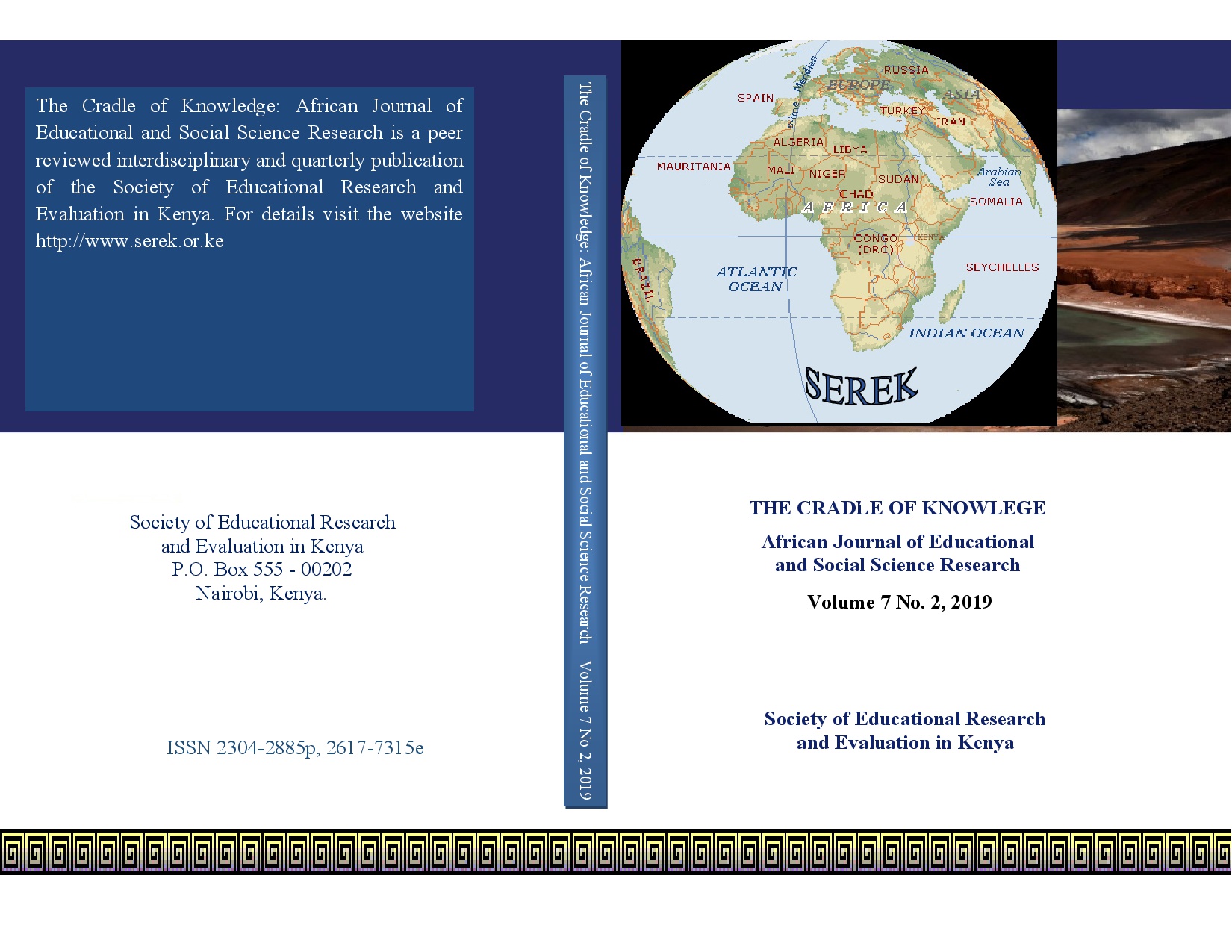
Influence of Child-headed Families on Preschool Learners’ Class Participation: A Case of Mwingi Zone, Kitui County, Kenya
Abstract
This study was designed to investigate whether child-headed families have influence on pre-school learners’ class participation. The study was carried out in Mwingi zone of Kitui County Kenya. The zone had a total of 67 public pre-schools and the study targeted all the 67 public pre-schools, 1030 pre-school learners and 88 pre-school teachers. The researcher employed descriptive survey design so as to get information from the sampled respondents. The researcher obtained the sample size of the study by using both probability and non-probability sampling techniques. The sampling techniques included stratified random sampling and purposive sampling. The schools in the zone were grouped into five clusters namely: Musukini, Kanzanzu, Mwingi, Ithumbi and Kyethani. The researcher used a representative sample of 10% of the targeted preschool learners and 20.5% of the targeted preschool teachers. To collect data from the respondents, the researcher used questionnaires and observation checklists. The questionnaires were used to collect data from pre-school teachers, while observation checklists were used to collect data from pre-school learners. After collecting the data, the researcher processed it by editing, coding, classifying and tabulating it and then analyzed the processed data using descriptive analysis, frequency distribution tables and percentages and Pearson Correlation Tables. The findings of the study indicated that there was a strong negative correlation (r= -0.891, P <0.05) between child-headed families and the class participation of pre-school learners. The study recommended that, the pre-schools should be encouraged to be conducting frequent guidance and counseling sessions for learners from child-headed families. Pre-school class teachers should also identify the learners who are not active in class participation and encourage them to be active in class by offering rewards.
Key Words: Family structure, child-headed family, Pre-school, Pre-school learner, Class
Participation, School accessFull Text:
PDFReferences
Begi, N. (2009). Research, monitoring and evaluation, Nairobi: Blesmo Research and Publications
Case, A., Paxson, C., & Abieidinger, J. (2004). Orphans in Africa: Parental death, poverty and school enrolment. Demography 41 (3): 483-508.
Cooper, C.E., Osborne, C.A., Beck, A.N., & McLanahan, S.S. (2011). Partnership instability, school readiness and gender disparities, Sociology of Education 83(3):246-259.
Fomby, P., Cavanagh, S. & Goode, J. (2011). Family instability and school readiness in the United States and the United Kingdom, Washington D.C: National center for family and marriage research; Working paper series wp-11-06.
Ermisch, J. E., &Fransescon, M. (2001). Family structure and children achievements. Journal of population economics, 14: 249 – 270.
Frisco, M., Muller, C., & Frank, K. A. (2007). Using propensity scores to study changing
family structure and academic achievement, Journal of Marriage and Family 69:721-741.
Gay, L. R. (1992). Educational research: competencies for analysis and application, 4thedition, Toronto, Mairill publishing company.
Kelly, S.J., Whitley, D. M., & Campos, P.E. (2010). Grandmothers raising grand children: Results of an intervention to improve health outcomes. Journal of nursing scholarship. 42(4): 379 -386.
Kombo, D. K., & Tromp, D.L.A. (2006). Proposal and thesis writing: An introduction. Nairobi. Paulines Publications Africa.
Lauglo, J. (2008). Family structure and school achievements.Demography 8: 3- 29.
Makufa, C., Drew, R., Mashumba, S., & Kambeu, S. (2001). Perceptions of children and community members concerning the circumstances of orphans in rural Zimbabwe, Harare, South Africa. AIDS information.
Mugenda, O.M., &Mugenda, A.G. (2003). Research methods: Quantitative and qualitative approaches, Nairobi, ACTS Press.
Mugenda, O.M., & Mugenda, A.G. (2012). Research methods: Quantitative and qualitative approaches, Nairobi, ACTS Press.
Nyambedha, E.O., Wandiba, S., & Aagaard-Hansen, J. (2003). Retirement cost: The new role of the elderly as caretakers for orphans in Western Kenya. Journal of cross-cultural gerontology,18:33 – 52.
Ochieng, N.D., Nyamwange, C. & Winga, M.A. (2018). Psychological implications of HIV and AIDS on child-headed households in Seme Sub-County, Kisumu County, Kenya. An international journal of scientific and research publications 8: 10.
Potter, D. (2010). Psychological wellbeing and the relationship between divorce and children’s academic achievement. Journal of marriage and family 72 (4): 940-944.
Safman, R.M., (2004). Assessing the impact of orphan-hood on Thai children affected by AIDS and their care givers. AIDS Care, 16 (1):11-19.
Skovdal, M., & Daniel, M. (2012). Resilience through participation and coping-enabling social environments. The case of HIV affected children in Sub-Saharan Africa. Africa journal of AIDS research, 11 (3): 153-164.
Steele, F., Single-Rushton, W., & Kravdal, O. (2009) Consequences of family disruption and children’s educational outcomes in Norway. Demography 46 (3): 565.
United Nations Children’s Fund, (2004). Children on the brink: A joint report of new orphan estimates and a framework for action. New York, UNICEF.
United Nations Children’s Fund, (2012) School readiness and transitions: Child friendly schools manual, New York, UNICEF.
Uwezo East Africa Learning Report, (2016). Are our children learning? Uwezo Kenya Sixth learning assessment report. Nairobi. Twaweza.
Refbacks
- There are currently no refbacks.
License URL: https://www.serek.or.ke
SEREK publication https://serek.or.ke
This work is licensed under a Creative Commons Attribution 4.0 International License